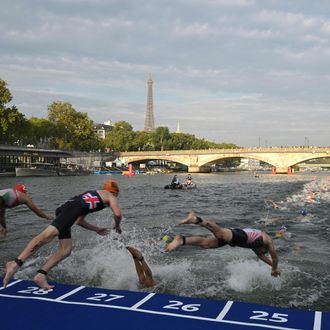
What’s stopping everything from going swimmingly? Long before the July 26 opening ceremony for the 2024 Olympics in Paris, there were concerns that the Seine wouldn’t be safe enough for the athletes who were scheduled to dive into the river for the marathon swimming and triathlon events. Taking a dip in the Seine has, with only a few exceptions, been banned for a century. But in July, Paris’s mayor swam in the Seine herself in an effort to prove it is now safe. If Paris officials are to be believed, costly cleanup efforts will sufficiently mitigate health risks posed by bacteria and pollution — and continue to do so even after the Olympics, since the plan is ultimately for the river with a murky reputation to open three public bathing sites by next summer. Still, where do we stand now that we’re halfway through Paris 2024, with only a few more races in the Seine to go? Below, here’s the latest you need to know on how cleanup is going, whether there’s a backup plan for this year’s Olympians, and what athletes who have already braved the waters have said about the experience.
How safe is the river now?
It seems to depend on the weather. Per Reuters, data published by local authorities on E. Coli bacteria levels in the Seine showed that the river was suitable for swimming six out of nine days between June 24 and July 2. Heavy rainfall can cause wastewater from Paris’s 19th-century sewage system to spill into the Seine. CNN reported that on June 30, following rain the day before, E. Coli levels in the Seine rose to double the acceptable level by World Triathlon standards.
Now, the Seine has had worse stats — official testing by the city of Paris reportedly showed that the river had above-acceptable levels of bacteria 22 out of 30 days between June 3 and July 2, including one rainy day that reached 10 times the acceptable level. (Per World Triathlon rules, unless the organization’s medical committee decides otherwise, the swimming leg of the triathlon must be canceled if E. Coli levels are above acceptable.) TL;DR: Paris 2024 organizers have probably been praying for clear skies before every event in the Seine.
However, the fluctuating safety was still a concern once the Olympics began. Raised contamination levels after rainfall meant the men’s triathlon race could not take place on July 30 as scheduled. Yet the event was only delayed by one day; Olympic officials said that water samples came back safe enough for the men’s event to be held along with the women’s event on July 31.
Did the mayor of Paris really go for a swim?
Yup. In a pre-Olympics effort to prove that the Seine was clean enough, Mayor Anne Hidalgo fulfilled a promise to test the waters and go for a dip in the Seine herself. Hidalgo previously postponed a swim scheduled for June 23, but later hinted at a new date. Per CNN, Hidalgo said in a French radio interview on July 10 that she would “dive in next week” and the water would be “depolluted, that’s for sure.” Hidalgo finally (wet)suited up and got in the Seine on July 17. “From here, we can not only host the Games, but also, in the years to come, bathe in the Seine,” she declared.
Prior to Hidalgo’s dip, French sports minister Amélie Oudéa-Castéra also took a swim in the Seine (per CBS News) on July 13. She wore a full body suit and swim cap, and was joined by by Alexis Hanquinquant, the Paralympic flag bearer for France. Luckily for all involved, it appears that no threatened poop protests came to fruition.
Wait, what’s this about a poop protest?
Sky News reported in June that more than 1.4 billion euros (about $1.5 billion dollars) have been spent trying to clean up the Seine. Not all Parisians are happy with the costly effort, arguing that the money would be better spent elsewhere. So when Paris mayor Anne Hidalgo and French president Emmanuel Macron both said they’d go for a dip in the Seine on June 23, some people wanted to quite literally shit on their plans.
A website encouraged people to poop in the river where fecal matter is already a concern, with some social media users declaring their intentions under the hashtag #JeChieDansLaSeineLe23Juin (I shit in the Seine on June 23). However, no mass defecation ultimately occurred, perhaps because the political leaders changed their plans: Mayor Hidalgo said she would delay her swim in the Seine until after the French elections in July, while President Macron has yet to announce a new date.
Is there a backup plan for the Olympians?
Oui. A Paris 2024 spokesperson said in a statement to CNN that there are “a number of contingency plans including options for postponing the events,” adding that the “final resort” for the triathlon events would be to just make them duathlons and remove the swimming part. Of course, you can’t exactly take the swimming out of marathon swimming, so there’s a different backup in place for that event. A Paris 2024 spokesperson told Reuters that if necessary, Olympic marathon swimmers could be moved to Vaires-sur-Marne Nautical Stadium, which is just outside of Paris and will already be used for the rowing and canoeing events.
What’s on the Seine swimming schedule?
We’ve still got a few outdoor water events left before the Olympics end. The mixed relay is currently scheduled for August 5, while the women’s and men’s marathon swimming events are set to take place on August 8 and 9, respectively. The men’s and women’s individual triathlon events were previously both held on July 31. (The men’s race was originally scheduled for July 30, but was postponed due to contamination levels.)
What have athletes said about swimming in the Seine?
Belgium’s Jolien Vermeylen, who finished 24th in the women’s triathlon, gave a chilling review: “While swimming under the bridge, I felt and saw things that we shouldn’t think about too much,” she said, per Metro. Vermeylen questioned whether the safety of athletes was being prioritized and noted that she tried to take precautions by taking probiotics. But she wasn’t able to stick to her plan of not swallowing the Seine’s water. “I drank a lot of water, so we’ll know tomorrow if I’m sick or not,” she said.
It seems like multiple people are just waiting to see how they feel in the days after their race. Britain’s Alex Yee, who won gold in the men’s triathlon, told the Associated Press that athletes have to trust organizers when they say that it’s okay to swim. “I’m sure we’ll find out in due time if that’s correct,” he added.
America’s Seth Rider, who finished 29th in the men’s triathlon, had previously quipped that he stopped washing his hands to try to build up immunity. Time reported that he later clarified, “Yeah, it was a joke. Hopefully I can handle some E. Coli because I think I swallowed so much water out there. Probably everyone did.” Meanwhile, other athletes have reportedly raised concerns not related to pollution, from the river’s surprisingly strong current to insufficient warm-up time in the water.
Compared to the triathletes, the marathon swimmers will be in the Seine for much longer, completing a 10 km (6.21 miles) course through a stretch of the river that was featured in the opening ceremony. We just hope that all the athletes stay safe and healthy! As viewers, we don’t want to watch the Olympics and have to worry that the competitors might actively be swallowing some poopy water. That’s just shitty TV.


